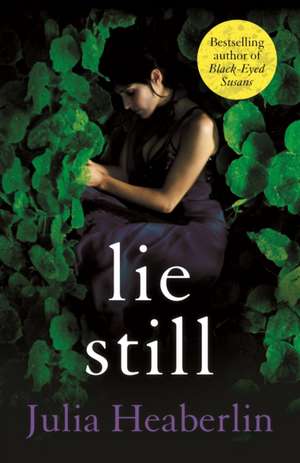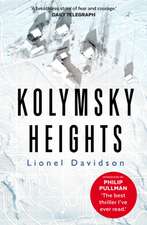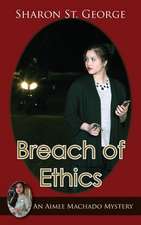Lie Still
Autor Julia Heaberlinen Limba Engleză Paperback – 29 dec 2016
| Toate formatele și edițiile | Preț | Express |
|---|---|---|
| Paperback (2) | 70.58 lei 3-5 săpt. | +12.65 lei 4-10 zile |
| FABER & FABER – 29 dec 2016 | 70.58 lei 3-5 săpt. | +12.65 lei 4-10 zile |
| Bantam – iul 2013 | 108.72 lei 3-5 săpt. |
Preț: 70.58 lei
Nou
Puncte Express: 106
Preț estimativ în valută:
13.51€ • 14.05$ • 11.15£
13.51€ • 14.05$ • 11.15£
Carte disponibilă
Livrare economică 24 martie-07 aprilie
Livrare express 07-13 martie pentru 22.64 lei
Preluare comenzi: 021 569.72.76
Specificații
ISBN-13: 9780571333202
ISBN-10: 0571333206
Pagini: 400
Dimensiuni: 131 x 198 x 27 mm
Greutate: 0.31 kg
Ediția:Main
Editura: FABER & FABER
ISBN-10: 0571333206
Pagini: 400
Dimensiuni: 131 x 198 x 27 mm
Greutate: 0.31 kg
Ediția:Main
Editura: FABER & FABER
Notă biografică
Julia Heaberlin, the author of Playing Dead and Lie Still, is an award-winning journalist who has directed arts and lifestyle coverage at the Fort-Worth Star Telegram and The Detroit News. She lives with her family in Texas, where she is at work on her next novel of psychological suspense.
Recenzii
“In this engrossing novel of suspense . . . [Heaberlin] expertly spins out a tale of lies and deceit that will keep the reader guessing.”—Publishers Weekly
“Heaberlin’s depiction of one tight-knit Texas community is both culturally savvy and politically astute. . . . A carefully wrapped package of Texas soap opera, social and political exposé, and well-paced thriller.”—Booklist
“Heaberlin combines a culturally pertinent suspense story (the plot revolves around the main character’s struggles with the repercussions of an unreported date rape) with satirical observations about Texas’ moneyed suburban elite.”—The New York Times
“Lie Still mixes serious discussion about ‘the last frontier in crime’ with a twisty-turny mystery plot and a cast of eccentric characters.”—Fort Worth Star-Telegram
“Reading a book by Julia Heaberlin is like hearing your best friend tell you a particularly thorny story, filled with secrets and intrigue and human hopes and failures. Lie Still is a book you want to curl up with for a good long while but, more important, Julia Heaberlin is an author you want to get to know.”—Jenny Milchman
“Julia Heaberlin weaves an intricate tapestry of secrets and suspense, lies and betrayals that kept me reading late into the night. Lie Still is a thriller par excellence and a page-turner, true—but it’s also a moving story of one woman’s unlikely path toward healing, and another’s lifelong search for redemption. I challenge you to visit Claremont, Texas—where nothing is quite as it seems and no one is quite who they claim—and leave unchanged.”—Emily Colin
“Julia Heaberlin deceives the reader in the most deliciously chilling way in Lie Still: With gorgeous prose and sterling character work, she takes us on a deeply felt and wonderfully composed thrill ride. Layer after layer of secrets, longing, and deception is peeled away and we begin to dread the twisted kernel at the heart, never guessing what Heaberlin has in store for us.”—Sophie Littlefield, bestselling author of Garden of Stones
“Packed with larger-than-life characters, twisty and dangerous secrets, and a captivating heroine you can’t help but root for as the stakes skyrocket and her own terrifying past roars back to claim her.”—Carla Buckley, author of The Things That Keep Us Here
“Mix a pregnant New Yorker with a big secret, an aging Southern belle who collects secrets like recipes, an exߝpageant queen, several plastic surgery victims, and a maid with an eye for revenge. Set in an upscale Texas community, and leaven with just the right amount of humor. I thoroughly enjoyed the result: a page-turning Texas gothic.”—Lisa Brackmann, author of Getaway
“Heaberlin’s depiction of one tight-knit Texas community is both culturally savvy and politically astute. . . . A carefully wrapped package of Texas soap opera, social and political exposé, and well-paced thriller.”—Booklist
“Heaberlin combines a culturally pertinent suspense story (the plot revolves around the main character’s struggles with the repercussions of an unreported date rape) with satirical observations about Texas’ moneyed suburban elite.”—The New York Times
“Lie Still mixes serious discussion about ‘the last frontier in crime’ with a twisty-turny mystery plot and a cast of eccentric characters.”—Fort Worth Star-Telegram
“Reading a book by Julia Heaberlin is like hearing your best friend tell you a particularly thorny story, filled with secrets and intrigue and human hopes and failures. Lie Still is a book you want to curl up with for a good long while but, more important, Julia Heaberlin is an author you want to get to know.”—Jenny Milchman
“Julia Heaberlin weaves an intricate tapestry of secrets and suspense, lies and betrayals that kept me reading late into the night. Lie Still is a thriller par excellence and a page-turner, true—but it’s also a moving story of one woman’s unlikely path toward healing, and another’s lifelong search for redemption. I challenge you to visit Claremont, Texas—where nothing is quite as it seems and no one is quite who they claim—and leave unchanged.”—Emily Colin
“Julia Heaberlin deceives the reader in the most deliciously chilling way in Lie Still: With gorgeous prose and sterling character work, she takes us on a deeply felt and wonderfully composed thrill ride. Layer after layer of secrets, longing, and deception is peeled away and we begin to dread the twisted kernel at the heart, never guessing what Heaberlin has in store for us.”—Sophie Littlefield, bestselling author of Garden of Stones
“Packed with larger-than-life characters, twisty and dangerous secrets, and a captivating heroine you can’t help but root for as the stakes skyrocket and her own terrifying past roars back to claim her.”—Carla Buckley, author of The Things That Keep Us Here
“Mix a pregnant New Yorker with a big secret, an aging Southern belle who collects secrets like recipes, an exߝpageant queen, several plastic surgery victims, and a maid with an eye for revenge. Set in an upscale Texas community, and leaven with just the right amount of humor. I thoroughly enjoyed the result: a page-turning Texas gothic.”—Lisa Brackmann, author of Getaway
Extras
1
For me, the rape is a permanent fixture on the clock, like midnight.
A point of reference.
I was nineteen years and four days old.
I remember because he treated me beforehand to a belated birthday dinner of scallops, chive mashed potatoes, haricot verts, and a bottle of mediocre wine. I was surprised when my plate arrived and haricot verts turned out to be ordinary green beans.
His name was Pierce Martin, one of those names that could work backward or forward. The sheets were Tommy Hilfiger.
I remember because he pressed my face into the pillow’s red and blue patriotic design to prevent me from screaming.
After my birthday dinner, our third date, he begged me to come back to his fraternity house and spend the night in his bed. No sex, he promised. Just kissing. Just holding. The wine made my world spin pleasantly, and he smelled sexy, a hint of musk and a little sweat left from a pickup basketball game. Before I took my first sip of wine, he told me he had scored twenty-five points.
I said yes to his room.
I trusted him.
I’d told him I was still a virgin, one of the girls who signed the celibacy pledge at church camp in eighth grade and meant it. He’d told me with a solemn face that he wanted his wife to be a virgin. He didn’t say anything about himself.
The first time he asked me out, also the first time he said hello, he slid an arm around my shoulders and walked me across campus as if he already owned the right. Sometimes I picture the moment, my face turned up to his, eager, a puppy, a lamb, a foolish girl. I want to slap her.
I was decently popular in high school but not material for the Pierce Martins of the world. So when Pierce--funny, smart, rich frat-boy Pierce--picked me out of at least fifty other girls in my college economics class, intoxication seeped its way into every insecure crack. He wasn’t looking for the test answers for next Tuesday from the girl who scored 103 on the last quiz. He wanted the other me.
As soon as I stepped inside his room that night, it began to feel weird. The lights were off. Pierce’s roommate lay sleeping across the top bunk, a long, dark lump, his face to the wall. Pierce had introduced him to me once, briefly, in the cafeteria. He was a legacy forced on the fraternity, a skinny freshman with random red splotches on his face from squeezing pimples, which he clearly despaired about when alone with the bathroom mirror. Pierce chose him for a little brother so he could abuse him the rest of the semester as a personal slave. He washed Pierce’s dirty underwear, fetched Pierce’s takeout, lied to Pierce’s mother on the phone.
It seemed funny, before the rape. How easily I lost my center.
“It’s OK,” Pierce assured me. “He won’t care. He’s a deep sleeper. Like in a tomb. Nothing wakes him.” I crawled hastily into the bottom bunk, suddenly wishing I hadn’t chosen a skirt over the pants I slid off at the last minute. I’d stay half an hour, tops, I decided, then say good night.
Lying flat in that dark cave, staring up at the bedsprings, I didn’t realize Pierce had stripped to a T-shirt and boxers until he pushed his body against mine and swirled his warm tongue in my ear. Still, I thought: This will be OK. Kissing. Maybe even a little more.
I sank into him. I was butter melting along the path of nomadic, expert hands. His tongue roved lower, a friendly snake. I didn’t want it to stop.
Minutes later, he slipped cool fingers up my skirt and yanked my underwear down. His nails raked the side of my leg, leaving a red scratch I’d find the next day.
“Please don’t.”
I said it as urgently as I could, leg stinging, my brain flipped back on like he’d thrown a switch. My voice was soft, not wanting to wake his roommate. Not wanting to humiliate any of us. I was still hopeful.
Those were my last words to Pierce Martin.
“You’re a tease.” He clapped his hand over my mouth and flipped me over. He’s done this before, I thought, struggling a little, still sure I’d get away, still trying not to wake his roommate, still wanting to limit my embarrassment. The roommate had an unfortunate name straight out of a historical romance. Pierce made fun of it. Wheaton. No, Haywood. That was it. Haywood Worthington.
Pierce gripped my hair and yanked my head backward, pain ripping through my skull. His lips brushed my ear like a lover’s. The whisper floated into my ear, down the dark tunnel to my brain, settling inside me.
“Lie still,” he said.
The night with Pierce wasn’t a fork in the road of my life because I didn’t get to pick which way to go. More like a screeching U-turn.
I’m thirty-two years old. Up to this point, I’ve told only five people about that night: the campus police officer on duty at 3 a.m., a bored woman who put down her pen and said I’d never be able to prove it; Rosemary Jansen, my roommate that semester, whom I don’t even exchange Christmas cards with; and my parents, who are no longer alive.
I still consider the rape a secret, but we all know there are really no secrets.
All of us walk around with ridiculous amounts of intimate information about strangers and acquaintances. We’d never get out of bed if we realized how much peripheral people in our lives know about us. What even the people we love most say behind our backs. The number of confidences broken.
A co-worker, a person named Anne whom I barely know, is the sister of a woman married to one of New York’s senators. Anne told me once over a happy hour that her sister keeps a private apartment in San Francisco for her lover. The senator, her husband, doesn’t know.
Just a stray fact, a shard of conversation that disappeared from her mind into the next tequila shot.
The senator is a regular on primetime news shows, and now every time I see him interviewed, I think, You’re famous. I’ve never met you. I’ve never met your wife. Our lives haven’t touched. But I know this thing that could blow up your world.
I wonder about the people on the periphery of my secret. My parents probably told Father Joe about the rape as they sought counsel from our family priest to help me. I’m sure Pierce bragged about that night to his fraternity brothers, who told their girlfriends, who in turn will use my story someday as a cautionary tale for their daughters.
I imagine my old roommate Rosemary bringing me up as a personal example of being touched by rape. That happened to my college roommate, she might say at a party of fellow suburbanites. I tried to get her to turn him in, call the frat board, anything, but she wouldn’t. She thought it was her fault.
It was my fault. I don’t care what a court of law says about the word no or my polite “please don’t.” I laid myself down in that bed. I was naive, stupid, shallow, flashing my virginity around like it somehow made me better. A prize somebody could win.
Haywood might still be keeping my secret because it was his, too. That night, Pierce branded us both with humiliation and guilt, the kind that embeds in your skin like a tick and spreads disease.
When my mind travels back there, the shame flares up from the embers, licking at my soul until I find myself flushed and kneeling over the toilet. So I’ve worked at not thinking about it.
Until Clairmont, Texas. This small dot on the map, thousands of miles away from where my story began, is the place that my past and present exploded.
My mother believed that Fate is a compass inside us. If she hadn’t met my father in college, she said, she would have found him somewhere else along the way. We choose our steps, she insisted, but they always take us to the place we’re meant to go.
I don’t know how she could reconcile such loosey-goosey mysticism with her belief in Catholicism, especially if she’d known how she and Dad were going to die.
If you follow her theory, we are responsible for running dead-on into the evil as well as the good.
Misty and Caroline turned out to be both. Good and evil.
My kindred spirits and my tormentors.
They were the catalysts to free my soul.
But their secrets almost killed me.
2
If someone asked a few months ago, I’d say my compass pointed north. But a strange wind blew me here, and I held my breath.
I didn’t want much. Just for every moment to be like this one. Blessedly normal. For the shadows to go poof, little vampires extinguished by the sun.
There was plenty of sun. Mike lay in a yellow patch of it, stretched out on the bed, nursing a bottle of Sam Adams, surrounded by piles of my discarded clothes. He flipped the pages of a Sports Illustrated while absently observing my state of fashion crisis.
I’d ripped open every U-Haul moving box that littered the floor of the room.
“Eyes up here,” I ordered. “What do you think of this?”
“I think it looks good. Just like the last five things you’ve tried on.” He patted the bed. “Why are you worrying about this so much? It’s not like you’re walking into a room full of celebrities. And, I’d like to point out, you’ve actually done that with a lot less drama beforehand.”
I propped the full-length mirror leaning against the wall in a better position to see the side effects of a protruding belly.
“I’d think you’d want me to wow them, chief,” I said, tugging the orange top down so it wouldn’t show the safety pin keeping my pants together. “This makes me look like a construction cone.” I yanked the top over my head and slung it at his head.
I’d started to really show in the last couple of months, but the move and goodbye lunches with colleagues and friends left no time for maternity shopping. In the life I’d resigned, as director of a small SoHo art gallery, I would throw on something black, a gold cuff, and be done with it. But even in the two short weeks we’d been in Texas, I could see that would make me look like a fat crow among a flock of colorful, glittery birds.
“I don’t want to stand out as too . . . New York. My father always said, ‘Make a bad first impression and you’re digging yourself out of a grave for years, make a good first impression and people--’ ”
“ ‘--will give you the benefit of the doubt forever.’ I’m familiar with the wisdom. And why do you think New York is an instant bad impression?”
“We’re snotty, rude, walk too fast, use big words when little ones will do just fine. Steal their best baseball players.”
Mike moved from the bed to the floor, kneeling with his ear pressed against my bare tummy. “Just be your quirky, sweet self,” he murmured. “Texas thanks God and the Yankees every day for stealing their overpriced baseball players. I hear they’ve incorporated it into the Lord’s Prayer.”
My hand rested gently on his head, shaved bare to avoid the inevitable, the unexpected bonus being that it made him look even fiercer during his seven-year run as an ATF agent. Mike had led a brotherhood of men who carried recessive genes from cavemen ancestors to kill and protect the way others carry genes for cancer and beauty. I’d watched these men drink beer and tease one another in my kitchen like regular guys, but they never, ever truly relaxed. I sleep beside one of them, so I know. They are different from the rest of us.
Our mirror reflected a happy, loving union. No fear, no tension, no anger. No hint of three years of painful infertility treatments, miscarriages, weeks of utilitarian sex, and hot words that nearly ripped us in two.
My eyes remained glued to the couple reflected there, hoping it was real. In Mike’s case, the bald look worked, like it did on men without ridged Cro-Magnon skulls, making him even more attractive than he was before.
“Come on, give me a more detailed rundown on my hostess tonight.” It was my practice to be fully equipped before negotiating a room of strangers.
“Three words,” I demanded. An old game we played.
Mike shrugged. “Rich. Widow. Tragic.”
“OK, need more than that. And your left hand needs to stop right there.”
“I think she lost a son,” he said. “I don’t know if she cast a vote, but she attended my final interview, so she wields power here in little Clairmont. Mostly with her wallet. I was told she provided seed money for some upgrades at the new head-quarters.”
So far, my only impression of Caroline Warwick was a soft Southern drawl on the other end of the phone. Three days ago, she invited me to a gathering of the town’s female elite and seemed slightly annoyed when I told her I’d have to get back to her. Despite his casualness now, Mike had urged me to accept. Get to know people, Emily. Help establish our new life.
Texas was not even a glimmer in our wineglasses on those late nights after the stick turned blue and we talked dreams with new urgency.
So Mike was lightly dismissive when an old FBI friend of his mentioned a position leading a well-funded police shop in a high-heeled Southern town, the kind of town rising on Fortune magazine lists. Clairmont, Texas, per capita the wealthiest, most highly taxed city of its size in the country, home to CEOs and Dallas Cowboy football players and Texas land barons and nouveau riche wannabes who carried mountains of mortgage and credit card debt.
But then there was a phone call from a persuasive headhunter. And another. Mike flew down first-class for two interviews. The salary shone like a gleaming platinum carrot: $175,000 a year, plus a bonus plan tied to lowering the town’s crime statistics, which were mostly connected to rowdy teens. In Texas, that amount of money meant something. Mike feared it also meant he’d been bought. I could tell it bugged him, this worry that he, the caped crusader, was selling out. That maybe he wasn’t hearing the whole story.
When the mayor told him the job came with a brand-new, fully loaded, armored Hummer, Mike thought he was joking. He asked if most Clairmonters carried grenades and ran from crime scenes on foot, in which case the Hummer would be fine. When nobody in the room laughed, he said he preferred a basic high-speed cruiser.
For me, the rape is a permanent fixture on the clock, like midnight.
A point of reference.
I was nineteen years and four days old.
I remember because he treated me beforehand to a belated birthday dinner of scallops, chive mashed potatoes, haricot verts, and a bottle of mediocre wine. I was surprised when my plate arrived and haricot verts turned out to be ordinary green beans.
His name was Pierce Martin, one of those names that could work backward or forward. The sheets were Tommy Hilfiger.
I remember because he pressed my face into the pillow’s red and blue patriotic design to prevent me from screaming.
After my birthday dinner, our third date, he begged me to come back to his fraternity house and spend the night in his bed. No sex, he promised. Just kissing. Just holding. The wine made my world spin pleasantly, and he smelled sexy, a hint of musk and a little sweat left from a pickup basketball game. Before I took my first sip of wine, he told me he had scored twenty-five points.
I said yes to his room.
I trusted him.
I’d told him I was still a virgin, one of the girls who signed the celibacy pledge at church camp in eighth grade and meant it. He’d told me with a solemn face that he wanted his wife to be a virgin. He didn’t say anything about himself.
The first time he asked me out, also the first time he said hello, he slid an arm around my shoulders and walked me across campus as if he already owned the right. Sometimes I picture the moment, my face turned up to his, eager, a puppy, a lamb, a foolish girl. I want to slap her.
I was decently popular in high school but not material for the Pierce Martins of the world. So when Pierce--funny, smart, rich frat-boy Pierce--picked me out of at least fifty other girls in my college economics class, intoxication seeped its way into every insecure crack. He wasn’t looking for the test answers for next Tuesday from the girl who scored 103 on the last quiz. He wanted the other me.
As soon as I stepped inside his room that night, it began to feel weird. The lights were off. Pierce’s roommate lay sleeping across the top bunk, a long, dark lump, his face to the wall. Pierce had introduced him to me once, briefly, in the cafeteria. He was a legacy forced on the fraternity, a skinny freshman with random red splotches on his face from squeezing pimples, which he clearly despaired about when alone with the bathroom mirror. Pierce chose him for a little brother so he could abuse him the rest of the semester as a personal slave. He washed Pierce’s dirty underwear, fetched Pierce’s takeout, lied to Pierce’s mother on the phone.
It seemed funny, before the rape. How easily I lost my center.
“It’s OK,” Pierce assured me. “He won’t care. He’s a deep sleeper. Like in a tomb. Nothing wakes him.” I crawled hastily into the bottom bunk, suddenly wishing I hadn’t chosen a skirt over the pants I slid off at the last minute. I’d stay half an hour, tops, I decided, then say good night.
Lying flat in that dark cave, staring up at the bedsprings, I didn’t realize Pierce had stripped to a T-shirt and boxers until he pushed his body against mine and swirled his warm tongue in my ear. Still, I thought: This will be OK. Kissing. Maybe even a little more.
I sank into him. I was butter melting along the path of nomadic, expert hands. His tongue roved lower, a friendly snake. I didn’t want it to stop.
Minutes later, he slipped cool fingers up my skirt and yanked my underwear down. His nails raked the side of my leg, leaving a red scratch I’d find the next day.
“Please don’t.”
I said it as urgently as I could, leg stinging, my brain flipped back on like he’d thrown a switch. My voice was soft, not wanting to wake his roommate. Not wanting to humiliate any of us. I was still hopeful.
Those were my last words to Pierce Martin.
“You’re a tease.” He clapped his hand over my mouth and flipped me over. He’s done this before, I thought, struggling a little, still sure I’d get away, still trying not to wake his roommate, still wanting to limit my embarrassment. The roommate had an unfortunate name straight out of a historical romance. Pierce made fun of it. Wheaton. No, Haywood. That was it. Haywood Worthington.
Pierce gripped my hair and yanked my head backward, pain ripping through my skull. His lips brushed my ear like a lover’s. The whisper floated into my ear, down the dark tunnel to my brain, settling inside me.
“Lie still,” he said.
The night with Pierce wasn’t a fork in the road of my life because I didn’t get to pick which way to go. More like a screeching U-turn.
I’m thirty-two years old. Up to this point, I’ve told only five people about that night: the campus police officer on duty at 3 a.m., a bored woman who put down her pen and said I’d never be able to prove it; Rosemary Jansen, my roommate that semester, whom I don’t even exchange Christmas cards with; and my parents, who are no longer alive.
I still consider the rape a secret, but we all know there are really no secrets.
All of us walk around with ridiculous amounts of intimate information about strangers and acquaintances. We’d never get out of bed if we realized how much peripheral people in our lives know about us. What even the people we love most say behind our backs. The number of confidences broken.
A co-worker, a person named Anne whom I barely know, is the sister of a woman married to one of New York’s senators. Anne told me once over a happy hour that her sister keeps a private apartment in San Francisco for her lover. The senator, her husband, doesn’t know.
Just a stray fact, a shard of conversation that disappeared from her mind into the next tequila shot.
The senator is a regular on primetime news shows, and now every time I see him interviewed, I think, You’re famous. I’ve never met you. I’ve never met your wife. Our lives haven’t touched. But I know this thing that could blow up your world.
I wonder about the people on the periphery of my secret. My parents probably told Father Joe about the rape as they sought counsel from our family priest to help me. I’m sure Pierce bragged about that night to his fraternity brothers, who told their girlfriends, who in turn will use my story someday as a cautionary tale for their daughters.
I imagine my old roommate Rosemary bringing me up as a personal example of being touched by rape. That happened to my college roommate, she might say at a party of fellow suburbanites. I tried to get her to turn him in, call the frat board, anything, but she wouldn’t. She thought it was her fault.
It was my fault. I don’t care what a court of law says about the word no or my polite “please don’t.” I laid myself down in that bed. I was naive, stupid, shallow, flashing my virginity around like it somehow made me better. A prize somebody could win.
Haywood might still be keeping my secret because it was his, too. That night, Pierce branded us both with humiliation and guilt, the kind that embeds in your skin like a tick and spreads disease.
When my mind travels back there, the shame flares up from the embers, licking at my soul until I find myself flushed and kneeling over the toilet. So I’ve worked at not thinking about it.
Until Clairmont, Texas. This small dot on the map, thousands of miles away from where my story began, is the place that my past and present exploded.
My mother believed that Fate is a compass inside us. If she hadn’t met my father in college, she said, she would have found him somewhere else along the way. We choose our steps, she insisted, but they always take us to the place we’re meant to go.
I don’t know how she could reconcile such loosey-goosey mysticism with her belief in Catholicism, especially if she’d known how she and Dad were going to die.
If you follow her theory, we are responsible for running dead-on into the evil as well as the good.
Misty and Caroline turned out to be both. Good and evil.
My kindred spirits and my tormentors.
They were the catalysts to free my soul.
But their secrets almost killed me.
2
If someone asked a few months ago, I’d say my compass pointed north. But a strange wind blew me here, and I held my breath.
I didn’t want much. Just for every moment to be like this one. Blessedly normal. For the shadows to go poof, little vampires extinguished by the sun.
There was plenty of sun. Mike lay in a yellow patch of it, stretched out on the bed, nursing a bottle of Sam Adams, surrounded by piles of my discarded clothes. He flipped the pages of a Sports Illustrated while absently observing my state of fashion crisis.
I’d ripped open every U-Haul moving box that littered the floor of the room.
“Eyes up here,” I ordered. “What do you think of this?”
“I think it looks good. Just like the last five things you’ve tried on.” He patted the bed. “Why are you worrying about this so much? It’s not like you’re walking into a room full of celebrities. And, I’d like to point out, you’ve actually done that with a lot less drama beforehand.”
I propped the full-length mirror leaning against the wall in a better position to see the side effects of a protruding belly.
“I’d think you’d want me to wow them, chief,” I said, tugging the orange top down so it wouldn’t show the safety pin keeping my pants together. “This makes me look like a construction cone.” I yanked the top over my head and slung it at his head.
I’d started to really show in the last couple of months, but the move and goodbye lunches with colleagues and friends left no time for maternity shopping. In the life I’d resigned, as director of a small SoHo art gallery, I would throw on something black, a gold cuff, and be done with it. But even in the two short weeks we’d been in Texas, I could see that would make me look like a fat crow among a flock of colorful, glittery birds.
“I don’t want to stand out as too . . . New York. My father always said, ‘Make a bad first impression and you’re digging yourself out of a grave for years, make a good first impression and people--’ ”
“ ‘--will give you the benefit of the doubt forever.’ I’m familiar with the wisdom. And why do you think New York is an instant bad impression?”
“We’re snotty, rude, walk too fast, use big words when little ones will do just fine. Steal their best baseball players.”
Mike moved from the bed to the floor, kneeling with his ear pressed against my bare tummy. “Just be your quirky, sweet self,” he murmured. “Texas thanks God and the Yankees every day for stealing their overpriced baseball players. I hear they’ve incorporated it into the Lord’s Prayer.”
My hand rested gently on his head, shaved bare to avoid the inevitable, the unexpected bonus being that it made him look even fiercer during his seven-year run as an ATF agent. Mike had led a brotherhood of men who carried recessive genes from cavemen ancestors to kill and protect the way others carry genes for cancer and beauty. I’d watched these men drink beer and tease one another in my kitchen like regular guys, but they never, ever truly relaxed. I sleep beside one of them, so I know. They are different from the rest of us.
Our mirror reflected a happy, loving union. No fear, no tension, no anger. No hint of three years of painful infertility treatments, miscarriages, weeks of utilitarian sex, and hot words that nearly ripped us in two.
My eyes remained glued to the couple reflected there, hoping it was real. In Mike’s case, the bald look worked, like it did on men without ridged Cro-Magnon skulls, making him even more attractive than he was before.
“Come on, give me a more detailed rundown on my hostess tonight.” It was my practice to be fully equipped before negotiating a room of strangers.
“Three words,” I demanded. An old game we played.
Mike shrugged. “Rich. Widow. Tragic.”
“OK, need more than that. And your left hand needs to stop right there.”
“I think she lost a son,” he said. “I don’t know if she cast a vote, but she attended my final interview, so she wields power here in little Clairmont. Mostly with her wallet. I was told she provided seed money for some upgrades at the new head-quarters.”
So far, my only impression of Caroline Warwick was a soft Southern drawl on the other end of the phone. Three days ago, she invited me to a gathering of the town’s female elite and seemed slightly annoyed when I told her I’d have to get back to her. Despite his casualness now, Mike had urged me to accept. Get to know people, Emily. Help establish our new life.
Texas was not even a glimmer in our wineglasses on those late nights after the stick turned blue and we talked dreams with new urgency.
So Mike was lightly dismissive when an old FBI friend of his mentioned a position leading a well-funded police shop in a high-heeled Southern town, the kind of town rising on Fortune magazine lists. Clairmont, Texas, per capita the wealthiest, most highly taxed city of its size in the country, home to CEOs and Dallas Cowboy football players and Texas land barons and nouveau riche wannabes who carried mountains of mortgage and credit card debt.
But then there was a phone call from a persuasive headhunter. And another. Mike flew down first-class for two interviews. The salary shone like a gleaming platinum carrot: $175,000 a year, plus a bonus plan tied to lowering the town’s crime statistics, which were mostly connected to rowdy teens. In Texas, that amount of money meant something. Mike feared it also meant he’d been bought. I could tell it bugged him, this worry that he, the caped crusader, was selling out. That maybe he wasn’t hearing the whole story.
When the mayor told him the job came with a brand-new, fully loaded, armored Hummer, Mike thought he was joking. He asked if most Clairmonters carried grenades and ran from crime scenes on foot, in which case the Hummer would be fine. When nobody in the room laughed, he said he preferred a basic high-speed cruiser.









